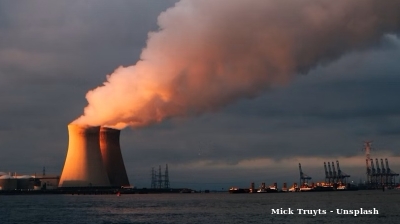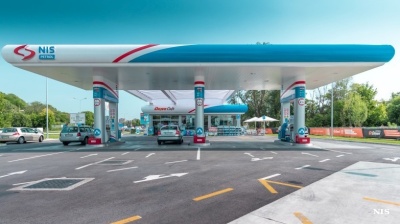Russia’s revenue from energy exports in the first 100 days of the war amounted to €93bn, according to a study by the Helsinki-based Centre for Research on Energy and Clean Air (CREA), and the EU remains the largest buyer of Russian gas and oil, even after the sixth package of sanctions was put in place that target energy.
Despite the West’s push to phase out Russian energy imports and deprive the Kremlin of revenues to finance its war in Ukraine, the country’s export revenues were in fact up by almost 40% year on year in May, on the back of soaring global prices, data published by CREA shows.
The EU is making a concerted push to sever energy ties with Russia over its actions in Ukraine, having already introduced a ban on coal imports from the country and agreed an embargo of up to 90% of oil supplies by the end of the year. While reluctant to take similar steps regarding Russian gas, the European Commission is calling for member states to make drastic cuts to gas use and increase imports from alternative suppliers under the REpowerEU plan, which it says could result in a two-thirds reduction in Russian gas deliveries to the bloc by year-end.
However, the report by CREA starkly indicates how much money the EU continues to hand over to Moscow in return for fulfilling its energy needs. Out of the total of €93bn ($97bn) that the country earned on fossil fuel exports, the EU accounted for €57bn, or 61%. The bloc contributed 85% of Russia’s revenues from pipeline gas exports, 75% of its revenues from oil product sales, 75% from LNG, 50% from crude oil and 30% from coal.
Russian energy imports were significantly affected in May by disruptions and heavy discounts to its crude oil exports, as well as a cut in gas supply volumes, following Gazprom’s decision to cut off supply to nine buyers in Bulgaria, Denmark, Finland, Germany, the Netherlands and Poland. Those countries had refused to comply with a Kremlin decree that required them to make their euro and US dollar-denominated payments to accounts set up at Gazprombank, to be converted into rubles before transfer to Gazprom.
Nevertheless, Russian hydrocarbon export revenues rose by nearly 40% y/y in May to €883mn in May. This was €43mn more than Russia is estimated to be spending on its war in Ukraine.
The reduction in volumes shaved €95mn off Russia’s daily receipts, and the discount on Russian oil wiped off a further €95mn. But these factors were more than offset by the €443mn growth in receipts that resulted from higher hydrocarbon prices. Revenues were down from an average of €1.1bn per day in January and February, although seasonality was a major cause of this decline.
On a country-by-country basis, the largest dents to Russia’s revenue stream were made by Poland and the US. Percentage-wise, sharp reductions were also achieved by Lithuania, Finland and Estonia.
Other buyers step up
China notably replaced Germany as the biggest buyer of Russian hydrocarbons during the 100-day period, importing a total of €12.6bn. While Chinese purchases have remained at a relatively constant level during the war, Germany was able to make a 25% reduction in its crude imports from Russia.
China, India, France, the UAE and Saudi Arabia also took advantage of the discount on Russian oil and expanded purchases. India emerged as a significant buyer, accounting for 18% of the country’s crude exports. The largest buyer was the Jamnagar refinery, which got 27% of its oil from Russia in May, up from less than 5% before April. Russian imports have mainly replaced arrivals from other sources in India, but the country has also seen an uptick in overall crude intake since the start of April, according to the report.
Most of this oil is re-exported in petroleum product form. This amounts to half of the petroleum products that the Jamnagar refinery produces in total.
CREA stressed it was important to target the shipping of Russian oil to prevent the country simply diverting its oil to other markets.
“As Russian oil is increasingly shipped to more distant markets, more tanker capacity than ever before is needed,” CREA said. “This is a key vulnerability – strong sanctions against tankers transporting Russian crude would significantly limit the scope for this kind of rerouting of Russia’s exports.”
In April-May, CREA estimated that 68% of the oil that Russia exported was on board ships owned by EU, UK and Norwegian companies. Greek tankers alone carried 43% of the total. 97% of the tankers were insured in just three countries – the UK, Norway and Sweden.
In its policy recommendations, CREA called for the sanctioning of all involvement in the transporting of Russian hydrocarbons to third parties, and the introduction of tariffs on Russian oil imports when they cannot be phased out immediately.
“Sufficiently high tariffs would encourage buyers not to purchase from Russia whenever possible, and curb the price paid to Russian suppliers on spot markets,” CREA said.
CREA also called for a plan to replace Russian fossil fuels with cleaner energy sources, and extra measurements regarding energy efficiency and energy savings to be implemented.
Features

Global leaders gather in Gyeongju to shape APEC cooperation
Global leaders are arriving in Gyeongju, the cultural hub of North Gyeongsang Province, as South Korea hosts the Asia Pacific Economic Cooperation summit. Delegates from 21 member economies are expected to discuss trade, technology and security.

Project Matador marks new South Korea-US nuclear collaboration
Fermi America, a private energy developer in the United States, is moving ahead with what could become one of the most significant privately financed clean energy projects globally.

CEE needs a new growth model as FDI plunges
wiiw economist Richard Grieveson says the CEE region’s long-standing model of attracting FDI through low labour costs no longer works.
KSE: Ukraine is facing a $53bn budget shortfall, but economy is stable for now
Ukraine is in urgent need of additional financing from partners as the continuation of the war drives up defence spending and reconstruction needs, jeopardizes budget financing, weighs on the balance of payments, and slows economic growth.




